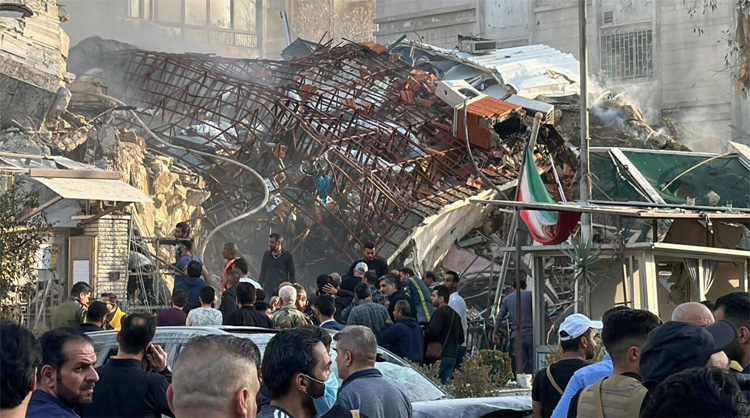Israel’s strike on Iran embassy in Syria kills 2 generals, Tehran vows ‘harsh’ response: 10 points
In a significant escalation, an alleged Israeli airstrike demolished Iran’s consulate building in Syria on Monday, killing two Iranian generals and five other officers.
Israel has made no remark on the attack so far. However, its military spokesperson blamed Iran for a drone strike on Monday in southern Israel.
According to reports, Israel’s warplanes shot six missiles at the compound in Damascus.
Here are 10 points on Israel-Iran tensions
According to reports, suspected Israeli warplanes bombed Iran’s embassy in Syria on Monday. Among those killed were three senior commanders. The incident took place in the Mezzeh district of Damascus.
Syria’s foreign minister Faisal Mekdad condemned the bombing. “We strongly condemn this atrocious terrorist attack that targeted the Iranian consulate building in Damascus and killed a number of innocents,” he said.
Iran’s ambassador to Syria, Hossein Akbari, said the strike hit a consular building in the embassy compound and that his residence was on the top two floors. He is, however, unharmed. Among those who died was Mohammad Reza Zahedi, a senior commander in its Quds Force, which is an elite foreign espionage and paramilitary arm. Israel has been targeting Iran’s military sites in Syria but this was the first time it attacked its embassy.
Israel refused to comment on “reports in the foreign media”. However, the New York Times cited four unnamed Israeli officials as acknowledging that Israel had carried out the attack.
Iran’s UN mission said the attack was a “flagrant violation of the United Nations Charter, international law, and the foundational principle of the inviolability of diplomatic and consular premises.” It said Tehran reserved the right “to take a decisive response.”
Hezbollah, the Lebanese group seen as Iran’s most powerful armed proxy in the region, vowed to retaliate. “This crime will not pass without the enemy receiving punishment and revenge,” the group said in a statement.
Muslim nations including Iraq, Jordan, Oman, Pakistan, Qatar, Saudi Arabia and the United Arab Emirates also condemned the attack, as did Russia.
Those who died in the attack included Haji Rahimi, described as a coordinator for the Quds Force. Hossein Aman Elahi, Mehdi Jalalati, Mohsen Sedaghat, Ali Aghababaee, and Ali Salehi Roozbahani also died in the attack. Iran says the attack was carried out using F-35 warplanes. “This is perhaps the first time that the Zionist regime allows itself to attack an official building of the Islamic Republic of Iran embassy, which had the flag of the Islamic Republic raised on top of it,” Akbari said.
Israel’s military spokesperson Rear Adm. Daniel Hagari said the building wasn’t a consulate or embassy but a military structure of the Quds forces disguised as a civilian facility. He said that on Monday, a drone attack on a naval base in southern Israel was “directed by Iran” and caused no injuries. Akbari, meanwhile, vowed revenge for the strike “at the same magnitude and harshness.”
Experts believe Iran will retaliate. Steven Cook, an analyst at the Council on Foreign Relations in Washington, said Iran can direct Hezbollah to escalate its attacks on Israel. “The IRGC can loosen restraints on proxies in Iraq and Syria, placing American forces in jeopardy again. The Iranians could also direct Hezbollah to escalate its attacks on Israel, which have been growing bolder and more numerous,” he said.
Israel has been fighting a protracted war in Gaza since October 7, since Hamas slaughtered 1200 people inside the country. Thousands of Palestianians have died in retaliatory strikes since then. Several militant groups that target Israel are allegedly backed by Iran.

